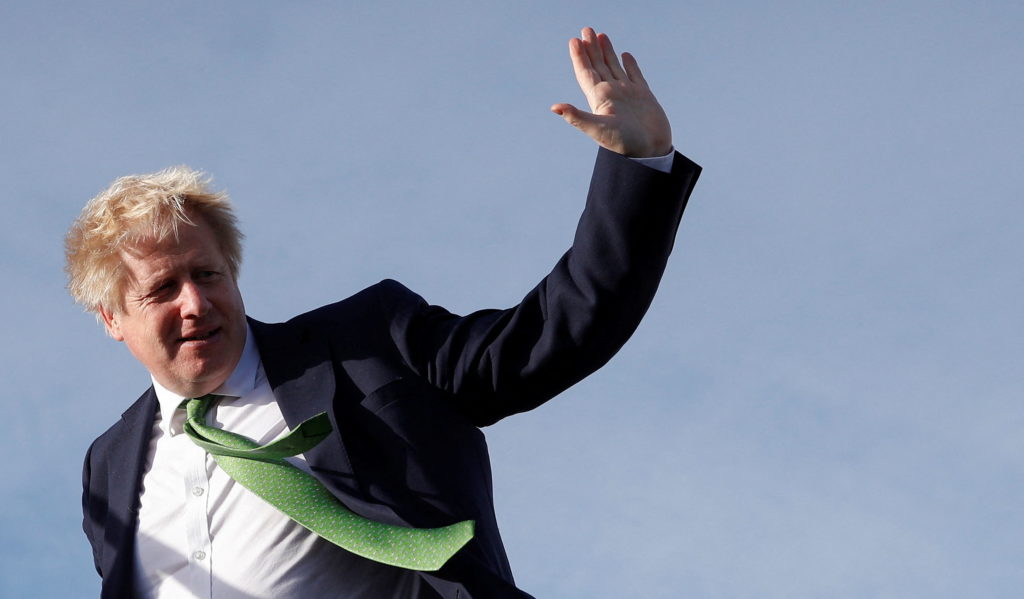Mr Johnson went to Washington this week to press Republican lawmakers on the need to sustain aid to Ukraine as Russia’s assault rolls on. The former prime minister, who was born in the States and could technically run for the presidency, sashayed into the offices of high-profile Congressional Republicans to lobby on behalf of the war-torn nation. But it wouldn’t be a Johnson away day without a high-profile bust-up. And, duly, the former foreign secretary clashed with Fox News anchor and Ukraine aid critic-in-chief Tucker Carlson after reneging on an interview request.
“We knew that Johnson was a coward — we watched during covid as he transitioned into a terrified old woman, but we had no idea he was a liar”, said Carlson who I suspect may not have followed British politics that closely in recent years. “Millions would die in the war that Boris Johnson is promoting”, was another finger-on-the-pulse claim.
It was a very public clash in a US tour otherwise characterised by clandestine meetings with Washington’s top Republican lawmakers. Among those treated to a Johnson tête-a-tête were Senate Minority Leader Mitch McConnell and Speaker of the House Kevin McCarthy.
Making the most of his post-prime ministerial political capital, Johnson imagines himself as Ukraine’s doughtiest intercontinental champion. But critics argue that his transatlantic lobbying may have more to do with self-importance than Churchillian resolve.


However, Johnson is not the only former prime minister to take his politics stateside in recent weeks. He followed the contrails of Liz Truss who toured Washington before the winter holidays in a further indication of her unabated ideological intent.
Unlike Johnson, Truss managed to avoid a public spat with a right-wing talking head, instead conferring with Republican lawmakers and activists in what has been described as a “research expedition to inform a comeback”. Having roundly failed to transplant American-style anti-tax politics onto British soil, here was Truss preaching to her converters — re-ensnaring herself in a tax-cutting firmament.
According to Politico, Truss was particularly enamoured with the work of the Republican Study Committee, an influential body within the House of Representatives that serves as an ideological anchor for the Grand Old Party. In a meeting with Representative Kevin Hern of Oklahoma, the group’s chair, Truss said she wanted to create a similar caucus in Westminster to “house all of their ideas into a collective group, in order to hold the current prime minister accountable”.
Truss aired a few names for this new force of organised Trussonomics. One, Hern told Politico, was the “Conservative Growth Group”.
Weeks later, dozens of Conservative MPs gathered in Simon Clarke’s parliamentary office to christen a new grouping with that exact name. Former chief whip Wendy Morton, former work and pensions secretary Chloe Smith and former DEFRA secretary Ranil Jayawardena were among those spotted at the inaugural assembly of Truss’ deregulatory rebel alliance.
Truss on Tour 2023: What does it all mean?
Truss’s tax-cutting trip comes at a moment of particular trial for small-state conservatives on both sides of the Atlantic. Under Joe Biden and Rishi Sunak, right-wing ideologies founded on deregulation have been shunned — both sides of the “special relationship” see economic pragmatism as the solution to rampant stagflation.
Equally, transatlantic tax-cutters are struggling to locate ideological champions ready to take up the small-state mantle. US Republicans are still wrestling with the legacy of Trumpism, whose namesake is already declared for a 2024 run. And in Britain, the post-prime ministerial activism of Johnson and Truss is imposing serve constraints on nominal lead Tory: Rishi Sunak.
Indeed, the real story of Ex-PMs of Tour 2023 is what it means for Sunak’s political prospects. For Truss and Johnson now appear to be locked in competition over who can present as the most prominent pretender to the Conservative crown. Each wants to be the lead lightning rod for Tory discontent and, significantly, both have calculated new strategies.
Johnson thinks his best way forward is to champion Ukraine, including pressuring Sunak to send over fighter jets. Conversely, Truss has landed on tax-cutting territory as she flaunts her familiar blueprint for downsizing government. But while the strategies may be different, the aims are the same: they both want to exploit grievances within the Conservative party as Sunak’s preference for underpromising curates an ideological vacuum for others to fill.
But the interesting thing here is that Johnson and Truss’ visions of Conservatism are not just different — they are arguably in conflict.
Indeed, Truss’ wish to shrink the state does not sit easily alongside Johnson’s high-spending approach to defence. It is the classic tax-and-spend trade-off, already familiar to Truss who refused to slash spending to fill the black hole incited by the mini-budget’s tax-cutting.
Tellingly, there is no political will in Britain to drop our commitments to Ukraine. Nor does the UK possess any consummate media patron such as Carlson, who will make the ideological case for cutting off aid. The Conservatives’ tricky positioning on tax-and-spend, therefore, appears to underline the party’s divergent political incentives.
But the trade-off itself is arguably not what matters — it is the politics. For while neither Truss nor Johnson are close to staging a full-fledged comeback, there remains a clear audience in the Conservative parliamentary party for their political pitches.
So Truss and Johnson’s battle for political relevance is also part of a broader trial for British Conservatism. Ideologically wedded to fiscal discipline, Sunak will be the last person to square the circle of his party’s simultaneous calls for high-spending and tax cuts.
But his political pain will continue, just as long as Truss and Johnson continue to fuel comeback rumours.

